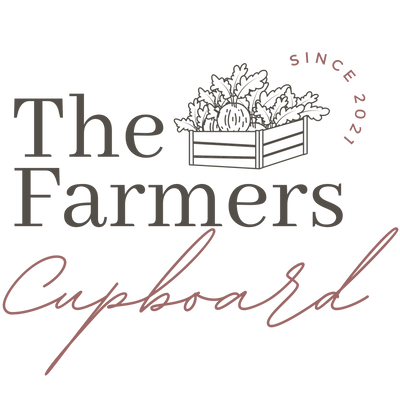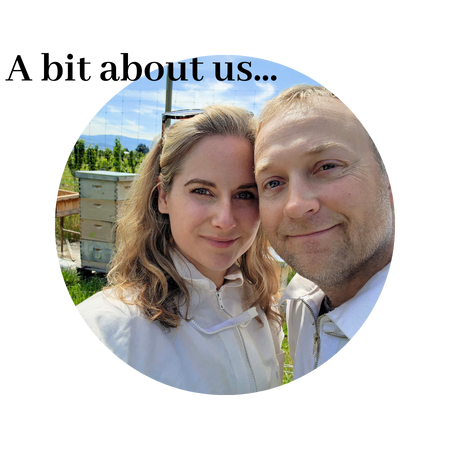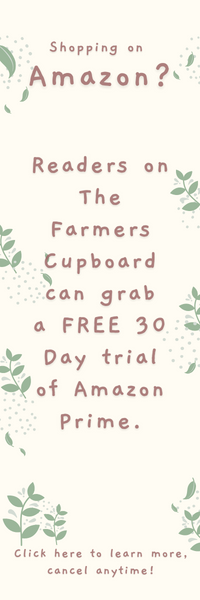Nowadays, attaining food is pretty easy. Most people have access to grocery stores or restaurants that provide them with enough food for the day. However, if you take a look around your local area, do you see many or any) any farms?
If you want healthy, good tasting food, you need to grow it yourself, and this includes learning about beekeeping. Beekeeping is slowly becoming a popular pastime, not just taken up by farmers, but by urban dwellers and backyard homesteaders as well.
Here is a big question: Why start beekeeping?
Why are people taking up beekeeping?
That is a question we are going to explore, and we are going to share all of the reasons for keeping bees and beekeeping for beginners.
There are so many environmental, nutritional and healthy benefits of keeping honey bees that I bet you haven't considered. I can tell you, as a backyard beekeeper, that it is good for the heart and the soul. Truly.
So let's look deeper at that question:
You can start a garden in your backyard, but that will only provide you with some fruit and vegetables. If you really want more sustainable food, you should consider keeping bees.
Honey bees provide you with:
- fresh (real) honey
- To get real honeycomb
- local pollination benefits for flowers, fruit, vegetables and herbs
- beeswax (for beeswax wraps, furniture polish, candles and more uses for natural beeswax)
- environmental stewardship
There are a number of other benefits that come along with beekeeping, so let's get into them.

What does beekeeping for beginners look like?
People keep honey bees for 3 main reasons:
1) People keep honey bees for the pollination benefits around flower and vegetable gardens
2) People keep honey bees for the sheer interest in beekeeping, likely sparked by the recent 'save the bees' mindset, or the interest in learning more about the intricate and amazing lives of bees
3) People keep honey bee colonies for the benefits of beekeeping byproducts, such as honey, beeswax and more, as well as the many things you can do with beekeeping byproducts, beginning beekeepers are generally brought to the hobby because of this, you just need some good beekeeping supplies and guidance to start.
Read all about the beekeeping supplies you need in our article here
The Benefits Of Beekeeping
1. Honey
Honey is a wonderful, natural substance that is simply good food and has thousands of healthy, sweet uses.
Before sugar, honey was the number one sweetener in the world and was extremely valuable before artificial sweeteners and even before trades in raw sugar. And who doesn't love eating honey?
So you can keep your honey for consumption, or you can sell honey. It's really up to you!
Today, the price of pure, unpasteurized honey varies, however, some recent polls show that honey purchased from a farmers market sells for anywhere between $10-$30 per liter. And people love purchasing local honey from local plants and wild plants.
It mostly depends on the presentation of the honey (jars and containers, labelling, add ons such as wood honey stir sticks, honeycomb, etc).
But if you can harvest your own honey, you are completely in control of it. You don't have to pasteurize your own honey so you can really experience all of those amazing nutritional benefits that you might not get from grocery store honey (hey, that's a selling point right there!).
For the beginning beekeeper, this is a natural first benefit for your own consumption.
Health Benefits
You can feel good knowing you are eating honey from your own backyard; not the same stuff at the grocery store (which is usually imported and is from bees who are fed sugar water as opposed to them sourcing their own nectar from wild flowers). Knowing where your food comes from is a huge benefit of keeping honey bees.
Here is a jar of our own honey crop harvested from the backyard hives. I caught it sitting on the window ledge with the sunlight behind it just right, so it looked like it was glowing.

2. Beeswax
Another amazing byproduct from beekeeping is beeswax. There are so many things beekeepers can do with beeswax! For example, you can make your own beeswax candles!
Read about the pros and cons of beeswax candles here
Before electric lighting, beeswax candles were very valuable, providing a clean flame with almost no smoke and dripless melts. Today, beekeepers make wonderful value-added candles and other creative items for sale from beeswax.
Read where to buy beeswax directly from beekeepers here
See the supplies needed to make candles here
Beekeeping for beginners usually involves collecting beeswax in small amounts. But as years go by, your beeswax collection will build over time.
Beeswax can also be used for making skin care products, lip balms, natural polishers, in cooking, making beeswax wraps and in many other arts and crafts.
Shop for the BEST beeswax wrap in our buyers guide here!
3. Pollination
If you grow flowers, herbs, fruit or vegetables, you can be sure to yield bigger and more abundant crops with honey bees present.
Bees pollinate gardens and crops for miles around their home hives.
According to the National Library of Medicine, the significance of bee pollination is integral in crop production: "[...] bee-pollinated crops contribute to approximately one-third of the total human dietary supply. Bees are considered significant pollinators due to their effectiveness and wide availability.
Bee pollination provides excellent value to crop quality and quantity, improving global economic and dietary outcomes. This review highlights the role played by bee pollination, which influences the economy, and enlists the different types of bees and other insects associated with pollination".
Needless to say having honey bees around will help your crops, and any neighbors crops as well!
Do you have to worry about bee stings?
Honey bees are docile by nature, unless they feel threatened or that you are going to take their precious honey (there are methods for collecting honey without being stung but that is a topic for another article!)
We have several hives in our backyard and we also have a lot of gardening areas and a lot of clover in our lawn. Our kids know to watch where they are playing and to never go running out in bare feet.
They are never bothered by the bees. Both kids have been stung once or twice, and it was only when they unintentionally grabbed a bee. It's really not a huge concern, and of course this is if you are not allergic.
Can you collect pollen from your honey bees?
Yes, you can place a pollen collector at your hive entrance which will gently brush the pollen off of your bees pollen baskets so you can collect your own pollen for health benefits. Pollen has a lot of healthy properties that many people like to include in their diet! Bee pollen is very sought after.
Check the price of a pollen collector on Amazon here
4. Renting Out Your Bee Hives
Believe it or not, pollination from bees is the number one way that commercial beekeepers make a living. Beekeepers keep many hives rent them out to commercial farms and orchards.
They advertise them on a rent-out basis and not only make money from renting out, but their bees get to bring back all of that wonderful pollen and nectar for the beekeepers honey harvest for that late summer.
Harvesting honey after using all your beekeeping knowledge to work your bee colonies is very rewarding!
Pollination contracts are not only essential for some agricultural businesses to thrive, but they also keep the big beekeepers in business.
Pollination is central to commercial beekeeping today, and it is a symbiotic relationship with commercial gardeners. Both sides benefit!
How many bees are in a hive?
A basic Langstroth style hive holds about 30,000 honey bees. So you can get a pretty good bee population in your own backyard with just one hive!

5. Environmental Awareness
Beekeepers naturally think differently about the world around them. If you want to become more environmentally aware, start beekeeping.
When you observe the bees and what they are doing in their daily rituals, you get a real sense of what is going on in the natural world.
Watching the bees enter and exit their colony, observing the pollen color, finding the queen bee (its good to look for the queen bee in every observation) as well as the behavior of the bees (young bees and older bees) will give you a great connection to the world around you
You will be concerned with how things out there are affecting your bees, such as weather, environmental incidents, droughts, local wildfires, too much rain and more. You will be totally connected to your environment on a new level.
How do you identify a Queen bee?
Queen bees are physically longer than the worker and drone bees (their body length almost doubles a worker bee). Also, her thorax will be a different color, and will likely be marked to identify her.
Learn all about the Queen Bee in our article here
6. Observational Learning
In the world of natural biology, bee behavior is a truly interesting subject. Bees make great research subjects!
Did you know that the honey bee genome was the third genome to be sequenced after the fruit fly and the malaria mosquito? Bees are fascinating! If you are looking for a hobby that will last a lifetime in learning and study, then this is it. Just the study of pollen alone can take you deep into amazing groups online who love to share knowledge with each other.
The topic feels limitless. The brood nest, hive tools, bee hive smoker, Langstroth hive, adult bee behavior, bee bread (not the stuff you eat, bees eat it!), timing for harvesting honey, hive body, yearly schedules like what to do in early spring, male bees, it goes on and on and is truly a hobby you will never become bored with because there are so many aspect.
7. A Sense Of Community In The Beekeeping World
Hobby beekeepers are often looking for local groups and communities to get involved with, so they can meet and learn from other beekeepers. Often, you will find others just like you who are eager to share information, knowledge, and stories of their successes and their teachable moments.
If you are looking for a hobby that comes with a fantastic sense of community, beekeeping is wonderful for that.
We hope you learned about the benefits of beekeeping! If any of these makes you want to learn more about beekeeping, have a look through our Bees & Honey section of the blog to learn more.
We want to encourage more backyard beekeepers to take up the hobby!
Here are some other articles you may be interested in reading:
BEST Ways To Use Beeswax Around The Home
Beekeeping Equipment List | How To Start
Did you like this article?
❤️ Here's how you can support our blog:
My name is Linnea and I am a backyard gardening enthusiast! Along with my husband and our two kids (and chickens, ducks and our little dog Izzy). Our hobby - growing our own food and making our meals from scratch. My blog, The Farmers Cupboard, is the website that blossomed from that passion. I love every second I spend sharing our hobby with like minded backyard growers.
It's easy to support my blog, and it is so appreciated. Please SHARE an article somewhere, pin a photo to your Pinterest board, follow on any of our social medias or sign up for our newsletter! That's it!
These little things help our blog grow and allow us to continue doing what we love: growing good food and sharing what we learn.
PINTEREST PASSIONATE? We're opening up our cupboard to you!
Click on the pin below made just for you. It will bring you right to my little Pinterest community, where I would love for you to FOLLOW The Farmers Cupboard and see all of our gardening and backyard dream ideas!
Let's grow good things together!













0 comments